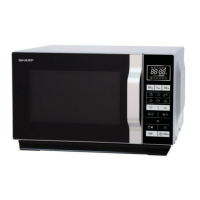GB-2
EN
HOW YOUR OVEN WORKS
Microwaves are energy waves, similar to
those used for TV and radio signals.
Electrical energy is converted into micro-
wave energy, which is directed into the
middle bottom of the cavity via a wave-
guide. Then the microwave stirrer distrib-
ute the microwave energy to every corner
of the cavity evenly.
Microwaves cannot pass through metal,
because of this the oven cavity is made of
metal and there is a ne metal mesh on the
door.
During cooking the microwaves bounce o
the sides of the oven cavity at random.
Microwaves will pass through certain mate-
rials, such as glass and plastic, to heat the
food. (See 'Suitable Ovenware’ on page GB-
27).
Water, sugar and fat in food absorb micro-
waves which cause them to vibrate. This
creates heat by friction, in the same way
your hands get warm when you rub them
together.
The outer areas of the food are heated
by the microwave energy, then the heat
moves to the centre by conduction, as it
does in conventional cooking. It is impor-
tant to turn, rearrange or stir food to ensure
even heating.
Once cooking is complete, the oven auto-
matically stops producing microwaves.
Standing time is necessary after cooking,
as it enables the heat to disperse equally
throughout the food.
NOTE:
This model uses a glass at tray instead of
turntable. The glass at tray is x ed by glue
at the bottom of the cavity, it won” t rotate
like a turntable. Simply place your dish on
top of the glass at tray.

